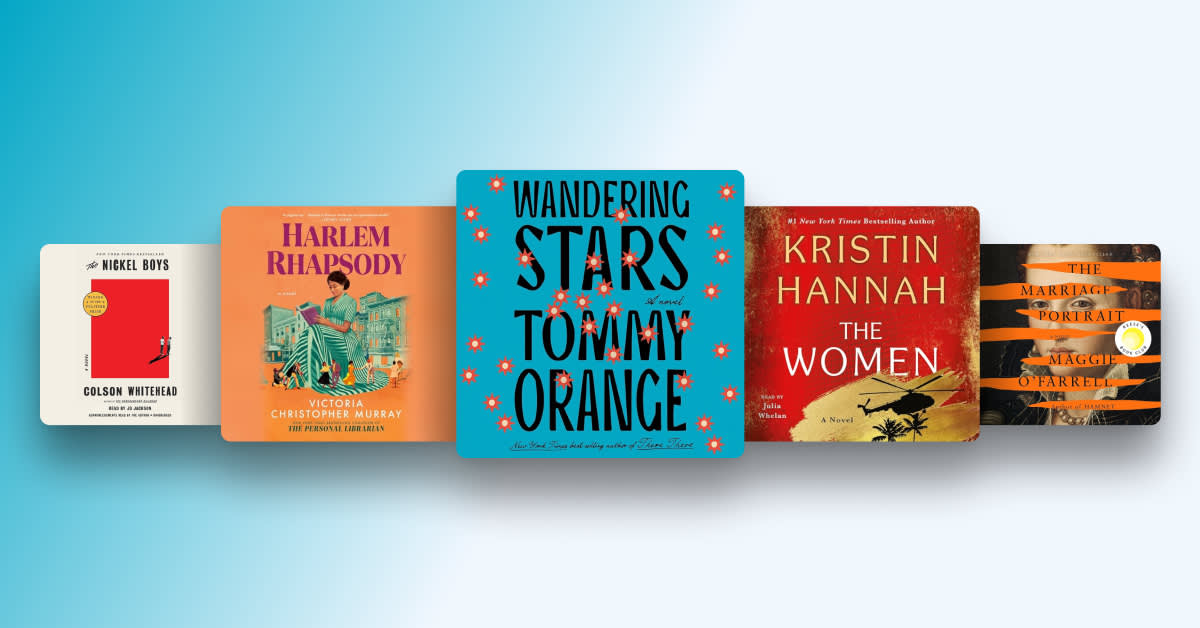While history is by definition the study of the past, no subject tells us more about the present, or is as exciting to follow in contemporary times. The range of subgenres within history writing is huge. Some authors cover a massive scope, while others zoom in to examine tiny, overlooked elements in a new way. History may focus on individuals or groups, or speculate on the significance of items, materials, and inventions. Unlike your history class of old, these selections don’t demand memorization of names and dates—instead, they explore unsolved mysteries, fascinating questions, and provocative concepts to ponder long after the final credits. Read on for the 20 best history audiobooks in our catalog.
This instant classic of history is explicitly titled for consumption in the present. And author Yuval Noah Harari is at his best as both historian and philosopher in this New York Times best seller that contemplates some of the most pressing questions of the modern world. Unabashedly intellectual in its careful dissection of religion, media, politics, and society at large, 21 Lessons for the 21st Century is made accessible for any listener with the assistance of Audie Award-winner Derek Perkins’s measured, contemplative narration.
If you shy away from history listens that are dry, know that A History of the World in 6 Glasses is anything but. Charting the significance of beverages throughout history, Tom Standage expertly sorts the entirety of human culture into six categories of drink: beer, wine, spirits, coffee, tea, and cola. Kept afloat by the expert influence of Earphones- and Audie Award-winning narrator Sean Runnette, 6 Glasses is an endlessly fascinating romp through place and time, from beer-as-currency-era Mesopotamia to the establishment of Coca-Cola as a hallmark of 20th-century globalization.
Listeners beware: this title also appears on our list of top true-crime audiobooks, and its central plotline involves serial murder. But if you can stomach the more gruesome elements, history enthusiasts will be rewarded—Larson’s glittering vignettes incorporate famous names such as architects Frederick Olmsted and Louis Sullivan, as well as landmark events, including the construction of the world’s first Ferris wheel. Winner of an Edgar Award for Best Fact Crime, The Devil in the White City is the haunting tale of the spectacular metropolis erected to house the 1893 Chicago World’s Fair—and the torture palace hidden within, where H.H. Holmes (who many consider to be the first recorded serial killer) lured women to their deaths. Performed to perfection by prolific Hall of Fame Narrator Scott Brick, this is one piece of history that is utterly unforgettable.
Given its ambitious scope, A Short History of Nearly Everything sounds like it would be an encyclopedia. But thanks to Bill Bryson’s conversational narrative style and English narrator Richard Matthews’s cheerful narration, this audiobook meets listeners exactly where they are, leaving them informed and entertained—without feeling overwhelmed. What makes Bryson’s perspective especially fun is that he himself admits to knowing very little about the topics at the outset, so the audiobook gives listeners the distinct feeling of learning alongside the author.
In terms of cultural influence, this audiobook packs an enormous punch. Not only did its subject establish the United States’s first national bank, write the majority of The Federalist Papers, and land himself on the face of the 10-dollar bill, but this particular biography is also the source material that inspired Lin-Manuel Miranda to pen the hit Broadway musical Hamilton. Though this listen may seem daunting at more than 35 hours long, the expert performance of Audie Award winner Scott Brick (known in audio circles as “the man with a golden voice”) keeps Chernow’s prose sounding fascinating and fast-moving throughout.
SPQR stands for “Senatus Populusque Romanus,” or “the Senate and People of Rome,” which is exactly the subject of this excellent, in-depth assessment of one of the world’s foremost empires. For easy listening, plan to arrive at this work with some basic knowledge of Roman history and culture. Author Mary Beard skips past the basic dates-and-names structure one might expect from a textbook and instead organizes her work thematically. This allows her to introduce the listener to more interesting questions like whether Hannibal’s elephants were really all that innovative for the time and how influential to Roman society the “bad” emperors like Caligula and Nero really were. Even those who are new to the genre will find Phyllida Nash’s clear, competent narration easy to digest, and listeners will walk away with an entirely new perspective on one of the most formative cultural empires in history.
If you went to school in the US, the Revolutionary War might not be your first topic of choice for an audiobook—after all, the subject was more than adequately covered in American History class, right? But that’s why David McCullough’s 1776 is such a masterpiece: it tells a story that most have already heard with an angle and emotionality that are utterly fresh. Narrating the work himself, McCullough gives the listener a boots-on-the-ground perspective on military events including the Battle of Dorchester Heights, the Battle of Long Island, and the crossing of the Delaware—the fateful mission that most consider to be the turning point of the war in favor of the Americans.
This selection was the winner of the first Theodore Roosevelt Association Book Prize—appropriate, seeing as that’s exactly who The Naturalist is about. Rather than characterizing the 26th president as a politician, Darrin Lunde instead composes a focused account of Roosevelt’s lifelong passion for nature. He then explores how that passion influenced his personal development and paved the way for the wildlife conservation movement in the United States. As a leader in museum naturalism himself, Lunde offers an informed perspective on Roosevelt’s life’s work. The author’s expertise, combined with primary source research that includes Roosevelt’s personal diaries and expedition journals, make for a colorful, adventurous listen, especially when paired with the vocal stylings of narrator Scott Brick.
As the source material for the Academy Award- and Golden Globe-winning film of the same name, 12 Years a Slave is an autobiography that reads like an intense and deeply harrowing novel. A first-person account of Solomon Northup, an educated free man of color who in 1841 was drugged, kidnapped, and sold into slavery, 12 Years a Slave reckons with the darkest moments of American history. Multi-award-winning actor Louis Gossett Jr. performs Northup’s stories of the unspeakable cruelties he witnessed and endured with nuance and dignity, making this a retelling that should be experienced in audio. Though the realistic nature of the horrors described don’t make for easy listening, Northrup’s memoir is an important work of art and an essential slice of American history.
Evolutionary biologist Jared Diamond’s examination of the development of mankind represents an interesting crossover between the historical and scientific, a juxtaposition that presents the listener with a unique angle on our collective past. Diamond’s analysis centers on the hows and whys of society’s evolution, zooming in on particular events and occurrences that we now know would alter the course of humankind, but at the time were the result of random happenstance. A meticulously researched, ambitiously scoped project that’s performed in the calm, confident cadence of Doug Ordunio, Gun, Germs and Steel will keep you engrossed with questions about who we are, where we came from, and how we can find meaning in an existence derived utterly by chance.
Another account of human cruelty that should be required listening for every adult, The Rise and Fall of the Third Reich goes beyond what you may have learned in school and maps out in explicit and arresting detail the social and political factors that allowed a megalomaniacal demagogue to both gain control of a nation and use that control to commit unspeakable atrocities. Author William Shirer’s experience as a Berlin-based war correspondent gave him a firsthand look at the rise of Nazi Germany, allowing him to tackle the subject as few others could. The resulting work—with spectacular narration that left one Audible listener asking, “Why can’t all readers be as good as Grover Gardner?”—is a masterful lesson in how, given a particular set of circumstances, it can be frighteningly easy to lead a country down the path to inhumanity.
Trying to trace the social, political, economic, and religious histories of the Holy Land—an ancient territory that has existed for all of human memory—can be frustrating. That’s why it is to Thomas Asbridge’s enormous credit that he manages to make the dense and complex history of the Crusades feel clear, uncomplicated, and fascinating to follow. Award-winning narrator Derek Perkins brings exactly the right amount of drama and intrigue to this account that weaves together emperors, kings, the Knights Templar, and more in a story that has, quite literally, defined history.
In this touchingly earnest profile, news journalist and author-narrator Tom Brokaw tells stories of the American military heroes, community leaders, neighbors, family members, and citizens at home and abroad during World War II. These nuanced, detailed profiles of people such as Senator Daniel Inouye—who lost an arm and earned a Medal of Honor overseas, only to come home and face prejudice for his Japanese-American background—shed new light on the experience of war and its aftermath. Told with love by a man who built his career reporting on American society, The Greatest Generation paints a full and achingly human picture of what it means to serve the greater good.
Overcoming a childhood of juvenile delinquency to become a celebrated runner and competitor in the Berlin Olympics would be a lifetime accomplishment for most people. But for Louis Zamperini, those events paled in comparison to the struggle for survival he later endured as an Army bombardier during World War II. After his plane went down over the Pacific, Zamperini survived 47 days adrift at sea, only to finally land ashore in the Japanese-occupied Marshall Islands, where he was captured and tortured for more than two years. The sheer number of emotionally ravaging scenarios Zamperini faced make Unbroken a particularly affecting, poignant listen that stands out from the crowd. The steady vocal performance of Edward Herrmann (known for his television work on Gilmore Girls and as the narrator of many PBS and History Channel productions) enlivens this tale of strength and survival against all odds.
In Mythos, actor, comedian, and audiobook narrator Stephen Fry steps behind the writing desk to apply his signature wit to some of the oldest stories in the world: the myths of ancient Greece. Fry’s storytelling—both as an author and a performer—enlivens these age-old tales with an interpretation that breathes heart and soul into the human-like antics of the gods. Retold with great love for the original texts, Mythos instills in these stories of love, war, adultery, revelry, comedy, and tragedy the vitality and life they deserve.
For fans of great literary portraitists Jack Kerouac and Joan Didion, The Electric Kool-Aid Acid Test offers a richly illustrated picture of 1960s Americana from the perspective of some of the decade’s most eclectic nonconformists. Tom Wolfe follows fellow author Ken Kesey—author of One Flew Over the Cuckoo’s Nest—as he and his gang of Merry Pranksters set off on a cross-country road trip inside a painted school bus, cheerfully tripping on LSD along the way. Hall of Fame narrator Luke Daniels’s steady, clear performance keeps the listener on track throughout the many twists and turns of this far-out adventure that, 50 years after its publication, is still considered one of the greatest works of its decade.
Linda Rodriguez McRobbie turns her historian’s eagle eye on the princess stories we grew up with to reveal that many of those so-called damsels in distress were actually hardened, tough, and ruthless. Hall of Fame Narrator Cassandra Campbell wields a wry delivery and a range of intonations, bringing a spark of humor to even the most gruesome stories, like that of the murderous Princess Olga of Kiev and the Nazi spy Princess Stephanie von Hohenlohe. This is definitely not a children’s book. But for grown-ups seeking a refreshingly realistic take on the gritty untold histories of female royalty, Princesses Behaving Badly is a crown jewel.
Robert F. Kennedy—former attorney general, presidential candidate, and brother of JFK—was known as a liberal firebrand who left an indelible mark on American politics. Though his influence was undeniable, there are still many details about the man’s life that often go overlooked. This biography presents RFK in honest, searing detail, following his growth from an arrogant, unsympathetic young man to an American figure known for his compassion, empathy, and dedication. This intimate perspective offers not only Larry Tye’s impeccably researched reporting but also first-person interviews with those who knew Kennedy best, some of whom have never spoken publicly to other biographers. When coupled with thoughtful, dynamic narration from voice artist Marc Cashman, Bobby Kennedy soars, offering a portrait of a public figure that is deeply personal.
As an anthropologist studying and teaching in Mongolia for decades, Jack Weatherford collected stories: the facts of Genghis Khan’s life (few, but significant), his legacy (huge), and the intimacy and specialness of Mongolian culture that changed and spread across the world under his aegis. Jonathan Davis’s stellar narration of every novelistic detail guarantees that this audio is among the very finest history works ever recorded.
This is a recent-history entry that also doubles as business and leadership advice from the Navy SEALs who led the most highly-decorated special ops unit of the Iraq War. Willink and Babin candidly narrate their own story, recounting gripping tales of their mission to secure the all-but-lost insurgent-held city of Ramadi.The second half of this work focuses on the authors’ lives after finishing their deployment. The stories of their reintegration into civilian life and the process of starting their own company are just as inspiring as the more harrowing details of their time overseas.
























